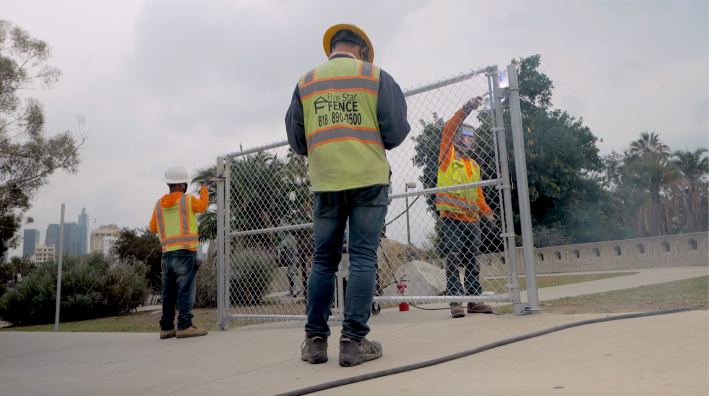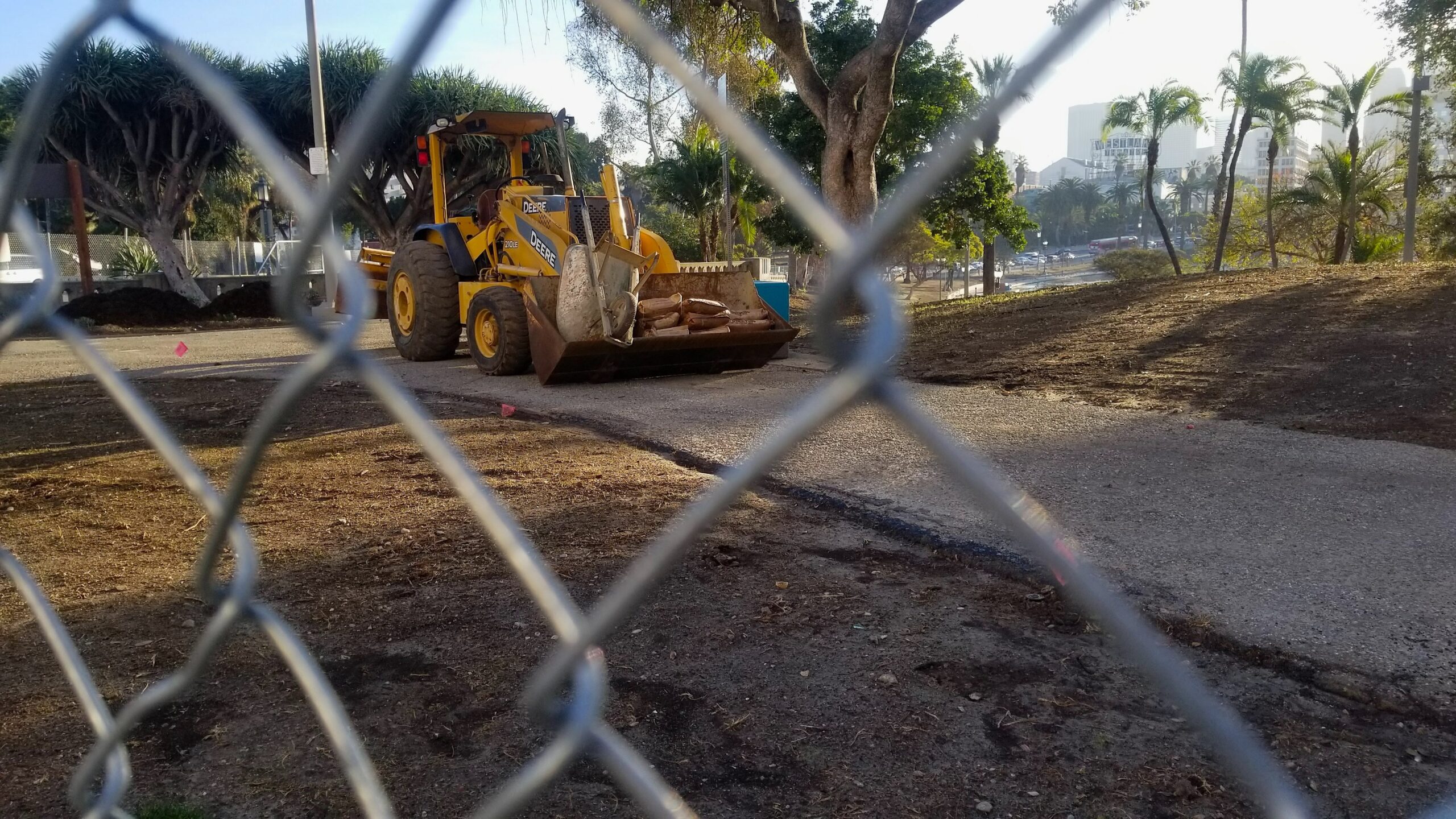February 22, 2022 Update: After months of delays, MacArthur Park will begin reopening at noon today. Portions of the fence surrounding the park will be removed, starting at Wilshire Blvd and working counterclockwise until the final section of fence on Alvarado St is removed, according to a press release from Councilmember Gil Cedillo's office.
February 10, 2022 Update: On February 5, a spokesperson for Councilmember Cedillo's told us: "Since work continues on completing all outstanding items an opening date cannot be announced."
January 24, 2022 Update: It looks like MacArthur Park will reopen soon but not before February 1, as predicted by Councilmember Gil Cedillo's office back in mid-December. In a January 24 statement, Cedillo's office told us they'll be announcing the parks reopening date next week. In the meantime, construction crews are currently wrapping up "all outstanding items like painting, slurring the asphalt walkways, redoing the parking lot, and other items." Cedillo's office said the project should be finished by next week.
When the southside of MacArthur Park was fenced off in mid-October, city officials promised it would be removed by the new year. Late last month, however, L.A. TACO learned that the reopening date for MacArthur Park Lake has been pushed back, igniting fresh skepticism about the future of one of Westlake’s only green spaces.
Critics question the timing of the closure and have accused Councilmember Gil Cedillo, the neighborhood’s city council representative, of pandering to property owners and anti-homeless constituents months before a contentious primary election. Cedillo claims that the park was closed after repairs were delayed for 18 months due to the COVID pandemic and a recent uptick in gang violence targetting the LGBTQ and unhoused communities.
In a December 18 statement to L.A. TACO, Conrado TerrazasCross, a spokesperson for Councilmember Cedillo attributed the delay to “supply chain challenges and workforce impacts” as well as recent rains. TerrazasCross told L.A. TACO that MacArthur Park will reopen by the first of February, “If mother nature and supply chains cooperate.” Cedillo’s office has not made any public statements about the new reopening date. Signs posted along the perimeter fence indicate that the park will reopen soon.
“The community has trusted us to close the park to do a quality rehab, and we aim to get it right to uphold that trust,” TerrazasCross told L.A. TACO on December 18. The closing of MacArthur Park was contested by some local residents and homeless advocacy groups. Over the holidays, a record amount of rain dumped on LA County, presumably further delaying the project.
“I’ll say that until this week it had been a notably dry winter,” Tom Bellino, a MacArthur Park resident and member of the local neighborhood council, told L.A. TACO last week. “And I’m not sure what park-rehabilitating supplies are being held at the ports. Are they using mulch and seeds from overseas?”
Roughly $1.5 million was budgeted to upgrade lights, repair benches, irrigation systems, and replant lawns around MacArthur Park Lake. Cedillo’s office did not respond to multiple follow-up requests to specify what aspects of the project were delayed due to supposed “supply chain challenges and workforce impacts.” A spokesperson for The Los Angeles Department of Recreation and Parks did not respond to a request for comment sent Tuesday afternoon.

Bellino admitted he is not a landscaping or a construction expert but he questioned why it’s taken so long to complete the project. “At least a week went by after the initial closure with no apparent work done, so I would ask if that’s the actual reason for the delay. If crews were not ready to start work on day one of the closure, why was the closure itself not postponed to allow more time to find housing for park residents?”
Before a portion of MacArthur Park closed in October for repairs, Cedillo promised it would not be a repeat of Echo Park Lake.
Before a portion of MacArthur Park closed in October for repairs, Cedillo promised it would not be a repeat of Echo Park Lake. “We have tried to learn from the experiences of our colleagues in Echo Park and Venice—and from the city collectively as we figure out how to go forward,” Cedillo told the Times before the park closed. The councilmember even went as far as circulating a “contrast chart” outlining the clearing of Echo Park Lake versus the plan to clear half of MacArthur Park. Residents of Echo Park Lake received official notice that they had to leave the park 24 hours before it closed, and residents of MacArthur Park were reportedly told 17 days in advance.
Before closing the park on Oct 15, Cedillo told media outlets that the goal was to get everybody into permanent housing: “'I’m confident we're going to be able to place all of them because we have all of the elements necessary for that."
According to the Los Angeles Homeless Services Authority (LAHSA) data obtained by L.A. TACO, 160 unhoused residents living in MacArthur Park were relocated to various interim shelter programs. Since then, a little more than a quarter of those residents have moved onto “other situations.” While only four residents have been placed into permanent supportive housing, and nine have moved onto “temporary situations.”
By comparison, about three months after Echo Park Lake was cleared, a little less than a quarter of the 183 unhoused residents transported to interim housing had left, and nobody had been moved into permanent supportive housing. Six months after the clearing, four residents moved into permanent housing.
In other words, the slightly different approaches to clearing the two parks have yielded similar results so far.
Another MacArthur Park resident and former neighborhood council president, Robin Lifland, told L.A. TACO she’d be surprised if the park reopens by February. “Highly, highly doubtful. What can they show for their work? A bunch of mud?” Lifland believes that Cedillo wants the park closed until the election. “Look at all the work they’ve been doing—only playing with dirt and laying a few pieces of sod.”
In the first week of the new year, construction workers took advantage of dry conditions. One side of the park was covered in fresh sod, and on the other side, tiny bright green sprigs of fresh grass poked out of the dirt. An excavator moved mulch piles from 7th Street to plant beds beneath trees by the lake. At the same time, ducks and geese munched on grass for the first time in weeks.
All that seemed to be missing were the people.







